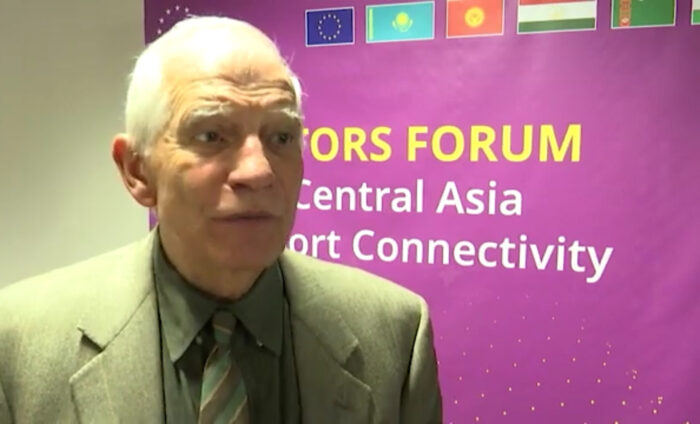ASTANA — Kazakhstan and the European Union (EU) signed four memorandums worth over 800 million euros (US$865.7 million) at the Global Gateway Investors Forum for the EU – Central Asia Transport Connectivity on Jan. 29 in Brussels.

EU High Representative for Foreign Affairs and Security Policy Josep Borrell on signing the memorandum worth over $500 million
photo credit: Snapshot from the interview with Kazinform Agency
One of the signed agreements includes a memorandum of understanding between Kazakhstan and the European Investment Bank (EIB) on financial resources to promote the development of the transport sector in the context of sustainable transport links between Europe, Kazakhstan, and Central Asia worth 500 million euros (US$541.2 million).
Welcoming the signing, EU High Representative for Foreign Affairs and Security Policy Josep Borrell stated the agreement would “contribute significantly to the economic rapprochement of Kazakhstan and the EU.”
Borrell emphasized the memorandum’s focus on further developing the Trans-Caspian International Transport Route (TITR) to enhance transit potential between EU countries and Central Asia by financing projects in Kazakhstan aligned with the goals of sustainable transport links between the two regions.
Another three memorandums include a memorandum of understanding between the Development Bank of Kazakhstan and the EIB worth 320 million euros (US$346.4 million), a memorandum of mutual understanding “On cooperation on strategic initiatives in the field of road, railway, port, and logistics infrastructure for the purpose of developing TITR between Kazakhstan and the European Bank for Reconstruction and Development (EBRD),” a memorandum of investment between DB C&E and the International Association “TITR.”
Minister of Transport Marat Karabayev expressed confidence that these agreements would provide a new impetus to cooperation between Kazakhstan and European partners. He emphasized the significance of the Global Gateway initiative, not just as a source of economic opportunities but also as a reflection of the strong demand for security and the expansion of global transport networks and supply chains.
Karabayev highlighted Kazakhstan’s role as the main link in the Middle Corridor and its potential as an alternative to East-West routes.
“We have formed a network of efficient transit transcontinental corridors and routes. In the east-west direction, the role of the Trans-Caspian international transport route has increased, as evidenced by the almost twofold increase in the cargo volume transportation between the EU, Central Asia and China at the end of 2023, reaching 2.8 million tons,” he said.
Kazakhstan plans to increase transit capacity, transport, and logistics assets over the next five years. Karabayev expressed interest in signing an agreement with the EU to develop the TITR, ensuring full loading from West to East (including the reverse) by developing infrastructure and the terminal network.
On the first day of the forum, the European and international financial institutions announced their commitment to invest 10 billion euros (US$10.2 billion) in the development of the TITR connecting Europe and Central Asia.
The European Investment Bank (EIB) Global has signed memoranda of understanding for project co-financing with Kazakhstan, the Kyrgyz Republic, Uzbekistan, and the Development Bank of Kazakhstan (DBK) worth 1.47 billion euros (US$1.6 billion).
The Global Gateway investment forum witnessed the participation of a delegation from Kazakhstan comprising more than 50 individuals representing over 25 public and private sector companies. The event focused on developing sustainable transport corridors and promoting stronger ties between Europe and Central Asia.
